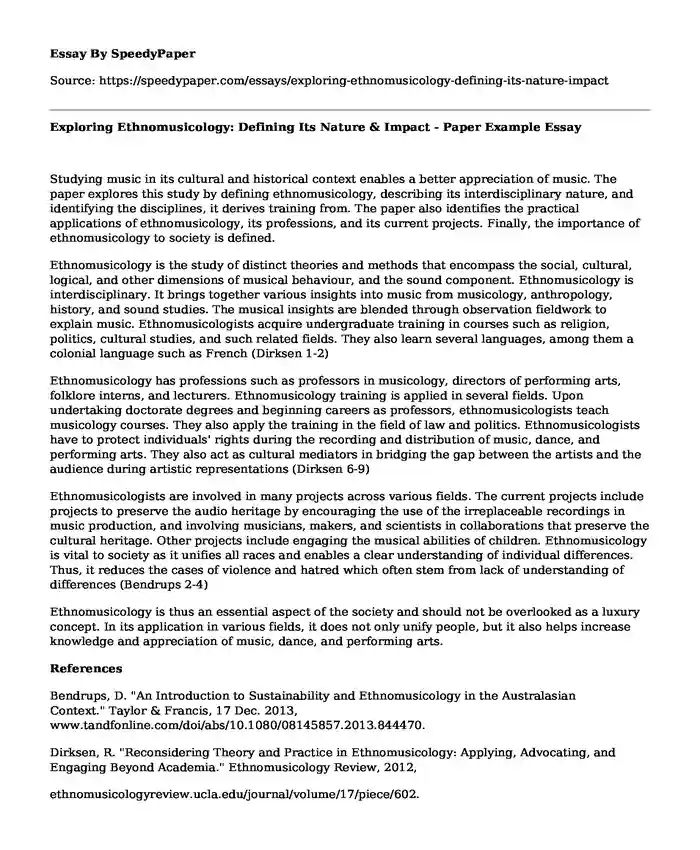Studying music in its cultural and historical context enables a better appreciation of music. The paper explores this study by defining ethnomusicology, describing its interdisciplinary nature, and identifying the disciplines, it derives training from. The paper also identifies the practical applications of ethnomusicology, its professions, and its current projects. Finally, the importance of ethnomusicology to society is defined.
Ethnomusicology is the study of distinct theories and methods that encompass the social, cultural, logical, and other dimensions of musical behaviour, and the sound component. Ethnomusicology is interdisciplinary. It brings together various insights into music from musicology, anthropology, history, and sound studies. The musical insights are blended through observation fieldwork to explain music. Ethnomusicologists acquire undergraduate training in courses such as religion, politics, cultural studies, and such related fields. They also learn several languages, among them a colonial language such as French (Dirksen 1-2)
Ethnomusicology has professions such as professors in musicology, directors of performing arts, folklore interns, and lecturers. Ethnomusicology training is applied in several fields. Upon undertaking doctorate degrees and beginning careers as professors, ethnomusicologists teach musicology courses. They also apply the training in the field of law and politics. Ethnomusicologists have to protect individuals' rights during the recording and distribution of music, dance, and performing arts. They also act as cultural mediators in bridging the gap between the artists and the audience during artistic representations (Dirksen 6-9)
Ethnomusicologists are involved in many projects across various fields. The current projects include projects to preserve the audio heritage by encouraging the use of the irreplaceable recordings in music production, and involving musicians, makers, and scientists in collaborations that preserve the cultural heritage. Other projects include engaging the musical abilities of children. Ethnomusicology is vital to society as it unifies all races and enables a clear understanding of individual differences. Thus, it reduces the cases of violence and hatred which often stem from lack of understanding of differences (Bendrups 2-4)
Ethnomusicology is thus an essential aspect of the society and should not be overlooked as a luxury concept. In its application in various fields, it does not only unify people, but it also helps increase knowledge and appreciation of music, dance, and performing arts.
References
Bendrups, D. "An Introduction to Sustainability and Ethnomusicology in the Australasian Context." Taylor & Francis, 17 Dec. 2013, www.tandfonline.com/doi/abs/10.1080/08145857.2013.844470.
Dirksen, R. "Reconsidering Theory and Practice in Ethnomusicology: Applying, Advocating, and Engaging Beyond Academia." Ethnomusicology Review, 2012,
ethnomusicologyreview.ucla.edu/journal/volume/17/piece/602.
Cite this page
Exploring Ethnomusicology: Defining Its Nature & Impact - Paper Example. (2023, Nov 30). Retrieved from https://speedypaper.com/essays/exploring-ethnomusicology-defining-its-nature-impact
Request Removal
If you are the original author of this essay and no longer wish to have it published on the SpeedyPaper website, please click below to request its removal:
- Essay Sample on Daniil Trifonov Recital
- Free Essay on Why Katherine Johnson Inspires and Motivates Me
- Free Essay Sample on Teaching Diverse Learners
- Free Essay Exploring the Influence of Songs to the Civil Right Movement
- Essay Sample. Employees' Social Media Use: Problem at Workplace
- History of Guitars - Free Essay Example
- The Connection of Clothes with Social and Economic Classes as in 'The Language of Clothes" - Paper Example
Popular categories





